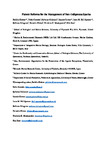Fishery reforms for the management of non-indigenous species
| dc.contributor.author | Kleitou, Periklis | |
| dc.contributor.author | Crocetta, F | |
| dc.contributor.author | Giakoumi, S | |
| dc.contributor.author | Giovos, I | |
| dc.contributor.author | Hall-Spencer, Jason | |
| dc.contributor.author | Kalogirou, S | |
| dc.contributor.author | Kletou, D | |
| dc.contributor.author | Moutopoulos, DK | |
| dc.contributor.author | Rees, Sian | |
| dc.date.accessioned | 2020-11-25T12:28:07Z | |
| dc.date.available | 2020-11-25T12:28:07Z | |
| dc.date.issued | 2020-11-25 | |
| dc.identifier.issn | 0301-4797 | |
| dc.identifier.issn | 1095-8630 | |
| dc.identifier.other | 111690 | |
| dc.identifier.uri | http://hdl.handle.net/10026.1/16679 | |
| dc.description.abstract |
Marine ecosystems are undergoing major transformations due to the establishment and spread of Non-Indigenous Species (NIS). Some of these organisms have adverse effects, for example by reducing biodiversity and causing ecosystem shifts. Others have upsides, such as benefits to fisheries or replacing lost ecological functions and strengthening biogenic complexity. Stopping the spread of NIS is virtually impossible and so the societal challenge is how to limit the socioeconomic, health, and ecological risks, and sustainably exploit the benefits provided by these organisms. We propose a move away from the notion that NIS have only negative effects, and suggest a turn towards an Ecosystem-Based Fishery Management approach for NIS (EBFM-NIS) in the Mediterranean Sea, the world’s most invaded marine region. A structured, iterative, and adaptive framework that considers the range of costs and benefits to ecosystems, ecosystem services, and fisheries is set out to determine whether NIS stocks should be managed using sustainable or unsustainable exploitation. We propose fishery reforms such as multiannual plans, annual catch limits, technical measures for sustainable exploitation, and legitimization of unlimited fishing of selected NIS and introduction of a radical new license for NIS fishing for unsustainable exploitation. Depending on local conditions, investment strategies can be included within the EBFM-NIS framework to protect/enhance natural assets to improve ecosystem resilience against NIS, as well as fishery assets to improve the performance of NIS fisheries. Examples of the former include the enhancement of Marine Protected Areas, harvesting of invasive NIS within MPAs, and protection of overfished predators and key species. Examples of the latter include market promotion and valorisation of NIS products, development of novel NIS products, and innovative/alternative NIS fishing such as fishery related tourism (‘pescatourism’). The application of the suggested EBFM NIS would create jobs, protect and enhance ecosystem services, and help to meet the United Nations Sustainable Development Goal 14: Conserve and sustainably use the oceans, seas, and marine resources for sustainable development. | |
| dc.format.extent | 111690-111690 | |
| dc.format.medium | Print-Electronic | |
| dc.language | en | |
| dc.language.iso | en | |
| dc.publisher | Elsevier BV | |
| dc.subject | Invasive alien species | |
| dc.subject | Ecosystem-based fishery management | |
| dc.subject | Ecosystem services | |
| dc.subject | Capital assets | |
| dc.subject | Marine protected areas | |
| dc.title | Fishery reforms for the management of non-indigenous species | |
| dc.type | journal-article | |
| dc.type | Journal Article | |
| plymouth.author-url | https://www.webofscience.com/api/gateway?GWVersion=2&SrcApp=PARTNER_APP&SrcAuth=LinksAMR&KeyUT=WOS:000613569700011&DestLinkType=FullRecord&DestApp=ALL_WOS&UsrCustomerID=11bb513d99f797142bcfeffcc58ea008 | |
| plymouth.volume | 280 | |
| plymouth.publication-status | Published | |
| plymouth.journal | Journal of Environmental Management | |
| dc.identifier.doi | 10.1016/j.jenvman.2020.111690 | |
| plymouth.organisational-group | /Plymouth | |
| plymouth.organisational-group | /Plymouth/Faculty of Science and Engineering | |
| plymouth.organisational-group | /Plymouth/Faculty of Science and Engineering/School of Biological and Marine Sciences | |
| plymouth.organisational-group | /Plymouth/PRIMaRE Publications | |
| plymouth.organisational-group | /Plymouth/REF 2021 Researchers by UoA | |
| plymouth.organisational-group | /Plymouth/REF 2021 Researchers by UoA/UoA07 Earth Systems and Environmental Sciences | |
| plymouth.organisational-group | /Plymouth/REF 2021 Researchers by UoA/UoA14 Geography and Environmental Studies | |
| plymouth.organisational-group | /Plymouth/Research Groups | |
| plymouth.organisational-group | /Plymouth/Research Groups/Marine Institute | |
| plymouth.organisational-group | /Plymouth/Users by role | |
| plymouth.organisational-group | /Plymouth/Users by role/Academics | |
| dc.publisher.place | England | |
| dcterms.dateAccepted | 2020-11-16 | |
| dc.rights.embargodate | 2021-11-25 | |
| dc.identifier.eissn | 1095-8630 | |
| dc.rights.embargoperiod | Not known | |
| rioxxterms.versionofrecord | 10.1016/j.jenvman.2020.111690 | |
| rioxxterms.licenseref.uri | http://www.rioxx.net/licenses/all-rights-reserved | |
| rioxxterms.licenseref.startdate | 2020-11-25 | |
| rioxxterms.type | Journal Article/Review |


